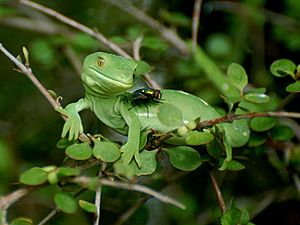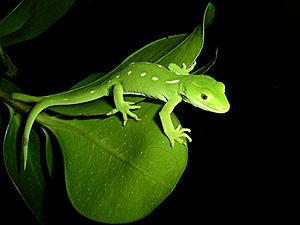Wellington green gecko facts for kids
Quick facts for kids Wellington green gecko |
|
|---|---|
 |
|
| Conservation status | |
 Gradual Decline (NZ TCS) |
|
| Scientific classification |
|
| Kingdom: | Animalia |
| Phylum: | Chordata |
| Class: | Reptilia |
| Order: | Squamata |
| Family: | Diplodactylidae |
| Genus: | Naultinus |
| Species: |
N. punctatus
|
| Binomial name | |
| Naultinus punctatus Gray, 1843
|
|
| Script error: The function "autoWithCaption" does not exist. | |
| Synonyms | |
|
|
Script error: No such module "Check for conflicting parameters".
The Wellington green gecko (Naultinus punctatus) is a special kind of gecko that lives only in the southern part of the North Island of New Zealand. It used to be considered a smaller group within the Auckland green gecko family. Together, they were known as the common green gecko.
This gecko is bigger and stronger than the Auckland green gecko. You can tell them apart by looking at their feet: the Wellington green gecko has yellow soles, while the Auckland one has grey-green soles. These geckos live in trees and bushes, especially in areas with kanuka and manuka trees. They hunt at night for insects like moths and flies. But they also enjoy resting in the sun during the day. If they feel threatened, they can act a bit fierce. They might open their blue mouths wide and make a barking sound.
Protecting the Wellington Green Gecko
What is its Conservation Status?
In 2012, the Department of Conservation in New Zealand looked at the Wellington green gecko. They decided it was At Risk of its numbers going down. This means there's a chance its population could get smaller over time. They also said they need more information about this gecko.
How are We Helping Them?
The Department of Conservation has been working hard to help these geckos. They have moved some Wellington green geckos to new, safe places.
For example, from 1997 to 2001, 22 geckos were moved to Mana Island. It looks like these geckos are now living well and making new families on Mana Island.
Later, between 2006 and 2013, over 90 Wellington green geckos were released onto Matiu / Somes Island. Each gecko was photographed, and their special markings were recorded. This helps scientists keep track of them. In early 2015, a young female gecko was found on the island. Her markings did not match any of the geckos that had been moved there. This was exciting news! It meant that the geckos were having babies on the island, and a new population was growing.
 | Selma Burke |
 | Pauline Powell Burns |
 | Frederick J. Brown |
 | Robert Blackburn |


